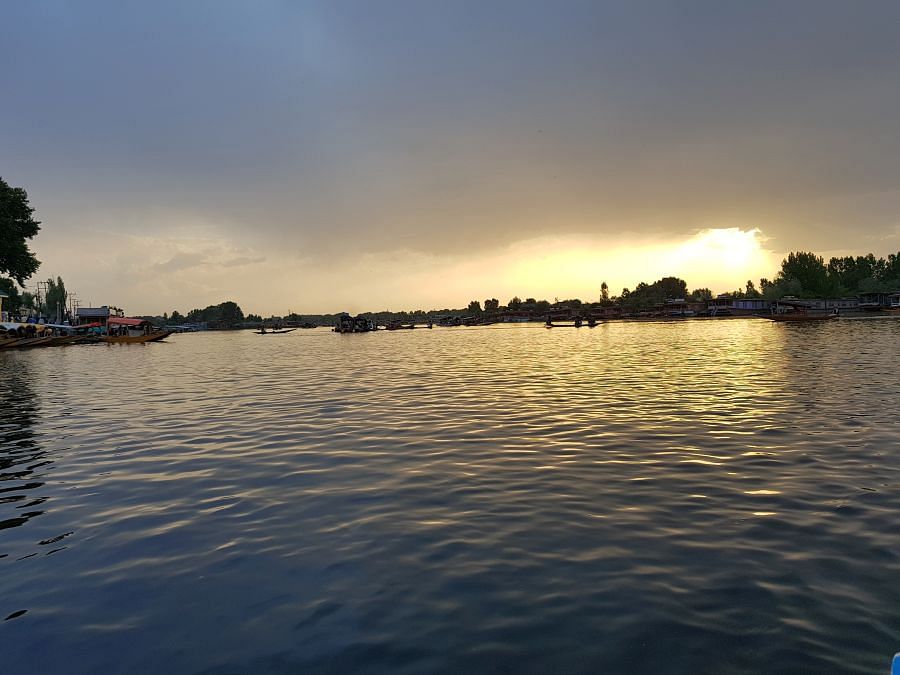
As I walked up the boulevard lining the picturesque Dal Lake in the heart of Srinagar, a chill wind blew through my hair. A group of men approached us and persuaded us to climb on to their colourful ‘shikaras’ that bobbed on the ripples of the lake.
After a few moments of haggling, we sat in a bright blue ‘shikara’. As Saliq, our ‘shikarawalla’, started rowing us, we left the bustling city behind. A calming silence had started to engulf us. All we could hear was the oar cutting through the water of the Dal Lake.
As we navigated through the Dal Lake, we saw the snow-covered Pir Panjal ranges on one side and the famous Mughal Gardens, Shalimar Bagh and Nishat Bagh, built by Jahangir, on the other.
The blue lake is broken by patches of pink lotuses, blue water lilies and thick algae growth. The thick algae growth has a detrimental effect on aquatic life.
We saw a group of men hard at work cutting the algae and mounting it on their small boats as part of the restoration process of the lake. Saliq stopped the ‘shikara’ at a small island known as the Char Chinnar. The place gets its name from the four Chinnar trees with bright red leaves that stood there. But now, due to various reasons, there are only three dried-up trees left there.
As we rowed away, the ‘shikaras’, selling an array of local commodities like beautiful silver jewellery, clothes with intricate Kashmiri embroidery, delicately-carved wooden ornaments and saffron, approached us. Bargaining with the vendors is very hard due to the immense warmth they exude.
Hari Singh, the former king of Jammu and Kashmir, had a houseboat on Dal Lake. It is now under military control.
Past Hari Singh’s houseboat, we passed by a number of floating restaurants serving food to the tourists who lounged in their ‘shikaras’ soaking in the serenity. We joined them and had a sip of the famous ‘quahwa’ and hot ‘pakoras’.
As the sun slowly started to set behind the mountain ranges, a boat filled with cheerful children in school uniform waved at us as they returned home from school. Saliq told us that a number of families inhabit the peripheries of the lake and their main mode of transport is boat.
Saliq, carefully manoeuvring our ‘shikara’ through the narrow streams, brought us to a bustling noisy market area. Men and women, perched on boats filled with fresh flowers and vegetables, were calling out to tourists to come and buy their goods. In the market, we could see proper shops selling clothes and household essentials, and a medical store too.
Saliq told us how over the years, he has seen the Lake change. He talked about, how as a young boy, when the lake was crystal clear, he and his friends would throw coins into it and dive to get them. They would quench their thirst by drinking water from the Lake. But now, the bottom of the Lake is not visible due to pollution and the thick algae growth.
The houseboats, which play a major role in attracting the tourists, pump out waste into the Lake. The increase in the tourists visiting the Dal Lake has rapidly degraded it.
We slowly started our journey back to the mainland where we saw women on tracts of land busy at work. Saliq told us that these floating gardens are locally known as ‘raad’. For centuries now, the inhabitants of the Lake have been cultivating tomatoes, cucumbers, musk and melons on these tracts of land.
Women are the ones who are primarily involved in the cultivation, he said. While explaining this to us, he quickly jumped on to the ‘raad’ to show us how his weight makes that piece of soil sink. What we initially thought was a piece of land turned out to be floating soil held down by thick roots and anchors.
As the night started to set in, we could see the once bustling lake retiring for the night.
We returned with the understanding that Dal Lake is not just a beautiful lake, it’s a culture that can be fathomed only when one experiences it.